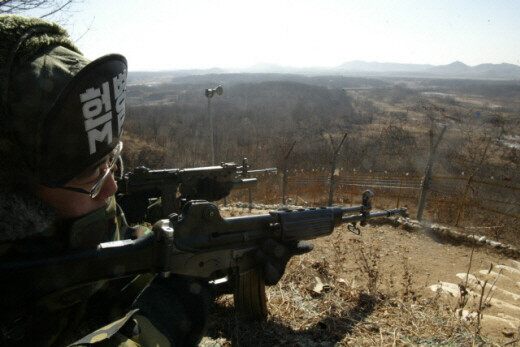hankyoreh
Links to other country sites 다른 나라 사이트 링크
Malaria health concerns rise due to decision to suspend projects in N.Korea

The Korean Sharing Movement (KSM), a private group engaged in North Korean aid efforts, announced Wednesday that a joint North Korea-South Korea malaria prevention effort it had been carrying out in North Korea in conjunction with Gyeonggi Province was effectively suspended due to a special request by the government in the wake of the Cheonan sinking. As a result, observers have voiced concerns about potential infections this summer among soldiers stationed near the demilitarized zone (DMZ) on the North Korean border and northern Gyeonggi residents in Paju and Yeoncheon as malaria mosquitoes make their way south.
A KSM representive announced Wednesday that following an informal inquiry to the Unification Ministry on April 30 about the possibility of sending diagnosis kits and prevention supplies to North Korea, the ministry responded that the delivery was not possible because it used funding from a “local government,” Gyeonggi Province. The representive also said that the group made another request to the ministry Wednesday regarding the delivery of items to North Korea.
“In light of the informal reaction from the Unification Ministry and the fact that preventive drug aid through international organizations is also currently suspended, it does not appear likely that a delivery permit will be issued,” the representive said. “Since malaria mosquitoes move south in the summer, prevention is an essential effort not only for the residents of North Korea but for those of South Korea as well.”
The supplies KSM has planned to send to North Korea include diagnosis kits, capable of quickly detecting malaria infection, for 120 thousand people. Also included is preventive medicine for 7,500 pregnant women, as well as larva eradication chemicals and mosquito repellent. The total value of the delivery has been estimated to value 400 million Won ($344 thousand). According to the schedule, the drugs would be provided to North Korea in May and June, before the summer begins in earnest, and joint prevention efforts would need to be carried out at the border region.
Experts expressed particular concern that a failure to provide North Korea with the diagnosis kits in a timely manner could boomerang back on South Korea by increasing the resistance of malaria mosquitoes.
“The consensus among experts is that there has been a rise in resistant cases, since North Korea, due to a lack of diagnostic equipment, tends to be indiscriminate in its use of malaria medicine,” said another KSM representive. “South Korea will also face direct harm if resistant mosquitoes move south, including reduced effectiveness of malaria medicine.”
KSM and Gyeonggi Province have carried out the prevention assistance project since 2008, targeting 130 thousand households and a population of 500 thousand people in Kaesong and surrounding areas in North Korea, including Changpung, Tosan and Kumchon, which are on or near the border with Gyeonggi Province. According to the Korea Centers for Disease Control and Prevention, there were 1,023 malaria cases in South Korea in 2008 and 1,317 in 2009.
Please direct questions or comments to [englishhani@hani.co.kr]
Editorial・opinion
![[Guest essay] The real reason Korea’s new right wants to dub Rhee a founding father [Guest essay] The real reason Korea’s new right wants to dub Rhee a founding father](https://flexible.img.hani.co.kr/flexible/normal/500/300/imgdb/original/2024/0423/8317138574257878.jpg) [Guest essay] The real reason Korea’s new right wants to dub Rhee a founding father
[Guest essay] The real reason Korea’s new right wants to dub Rhee a founding father![[Column] ‘Choson’: Is it time we start referring to N. Korea in its own terms? [Column] ‘Choson’: Is it time we start referring to N. Korea in its own terms?](https://flexible.img.hani.co.kr/flexible/normal/500/300/imgdb/original/2024/0423/3617138579390322.jpg) [Column] ‘Choson’: Is it time we start referring to N. Korea in its own terms?
[Column] ‘Choson’: Is it time we start referring to N. Korea in its own terms?- [Editorial] Japan’s rewriting of history with Korea has gone too far
- [Column] The president’s questionable capacity for dialogue
- [Column] Are chaebol firms just pizza pies for families to divvy up as they please?
- [Column] Has Korea, too, crossed the Rubicon on China?
- [Correspondent’s column] In Japan’s alliance with US, echoes of its past alliances with UK
- [Editorial] Does Yoon think the Korean public is wrong?
- [Editorial] As it bolsters its alliance with US, Japan must be accountable for past
- [Guest essay] Amending the Constitution is Yoon’s key to leaving office in public’s good graces
Most viewed articles
- 1[Guest essay] The real reason Korea’s new right wants to dub Rhee a founding father
- 2Terry Anderson, AP reporter who informed world of massacre in Gwangju, dies at 76
- 3Why Korea shouldn’t welcome Japan’s newly beefed up defense cooperation with US
- 4[Column] ‘Choson’: Is it time we start referring to N. Korea in its own terms?
- 5Senior doctors cut hours, prepare to resign as government refuses to scrap medical reform plan
- 6Opposition calls Yoon’s chief of staff appointment a ‘slap in the face’
- 7[Column] The clock is ticking for Korea’s first lady
- 8New AI-based translation tools make their way into everyday life in Korea
- 9[Editorial] Japan’s rewriting of history with Korea has gone too far
- 10[Column] Are chaebol firms just pizza pies for families to divvy up as they please?